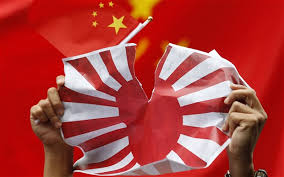


February 13, 2013 – CHINA - Tanks,
one by one, moving along a main road in China’s coastal Fujian
province. Driving up speculations that the Chinese military may be
warming up for war. Local residents took these pictures between February
3 to February 6. At times, the line of tanks and artillery blocked
traffic for several miles. And it wasn’t just in Fujian province. These
military vehicles were spotted further up the coast, in neighboring
Zhejiang province. According to dissident website, molihua.org, these
tanks in Hubei province are being transported from a military base to
the coast. The troop movements come after months of escalating tensions
between China and Japan over the disputed territory of the Diaoyun, or
Senkaku islands and they’re known in Japan. It’s caused international
worries that the two countries may be on the cusp of war. Both sides
have scrambled jets and warships in the region. In January, during naval
exercise near the disputed waters, Chinese warships reportedly directed
their targeting radar at a Japanese vessel. On February 7, State-run
Global Times published this article saying there is a “serious
possibility” a military conflict may flare up between China and Japan.
It continues to say that fewer and fewer people are hopeful for a
peaceful resolution to the Diaoyu Island crisis. Are we in a countdown
to war between China and Japan? NTD will continue to keep you posted as
the situation develops. –NTD
 Japan proposes military hotline with China -The
Japanese government wants to move ahead with the creation of an
emergency military hot line with China as tensions remain high over
allegations Beijing used weapons-targeting radar against Japanese naval
forces, Parliamentary Secretary for Defense Masahisa Sato said Tuesday.
Mr. Sato—an upper house lawmaker and the third-most-senior elected
official overseeing the defense ministry after the minister and vice
minister—also said he hoped Prime Minister Shinzo Abe and U.S. President
Barack Obama would discuss security issues at a planned summit later
this month. Mr. Sato described the alleged radar-locking incidents as
“outrageous.” He said he was disappointed with Beijing’s rebuttal that
Tokyo’s accusations were baseless and aimed at stoking tensions between
the two countries. “A hot line may not be enough. We’d also like to
consider creating a framework where vessels of both parties can directly
communicate on-site to avoid such incidents,” he said in an interview.
On Friday, China denied Japanese accusations that Chinese naval ships
locked weapons-guiding radar on two occasions in January—once on a naval
vessel, and once on a helicopter. Chinese officials said normal
radar—not weapons-targeting radar—was used in both instances, blaming
close monitoring by Japanese forces for aggravating the situation. The
U.S. supports Japan’s claims. A State Department spokesperson said
Monday it believed the incidents took place as Japan describes them. “In
normal circumstances, such radar is directed when attacking an opposing
ship. Doing this as a mere act of provocation is just inconceivable in
light of common military custom,” Mr. Sato said. “Generally speaking, a
weaker military would have fired shots” in response to such moves. No
shots were fired, but Prime Minister Abe has demanded that Beijing
apologize. Defense Minister Itsunori Onodera said Saturday the
government may release evidence of the radar-locking incidents. -WSJ
Japan proposes military hotline with China -The
Japanese government wants to move ahead with the creation of an
emergency military hot line with China as tensions remain high over
allegations Beijing used weapons-targeting radar against Japanese naval
forces, Parliamentary Secretary for Defense Masahisa Sato said Tuesday.
Mr. Sato—an upper house lawmaker and the third-most-senior elected
official overseeing the defense ministry after the minister and vice
minister—also said he hoped Prime Minister Shinzo Abe and U.S. President
Barack Obama would discuss security issues at a planned summit later
this month. Mr. Sato described the alleged radar-locking incidents as
“outrageous.” He said he was disappointed with Beijing’s rebuttal that
Tokyo’s accusations were baseless and aimed at stoking tensions between
the two countries. “A hot line may not be enough. We’d also like to
consider creating a framework where vessels of both parties can directly
communicate on-site to avoid such incidents,” he said in an interview.
On Friday, China denied Japanese accusations that Chinese naval ships
locked weapons-guiding radar on two occasions in January—once on a naval
vessel, and once on a helicopter. Chinese officials said normal
radar—not weapons-targeting radar—was used in both instances, blaming
close monitoring by Japanese forces for aggravating the situation. The
U.S. supports Japan’s claims. A State Department spokesperson said
Monday it believed the incidents took place as Japan describes them. “In
normal circumstances, such radar is directed when attacking an opposing
ship. Doing this as a mere act of provocation is just inconceivable in
light of common military custom,” Mr. Sato said. “Generally speaking, a
weaker military would have fired shots” in response to such moves. No
shots were fired, but Prime Minister Abe has demanded that Beijing
apologize. Defense Minister Itsunori Onodera said Saturday the
government may release evidence of the radar-locking incidents. -WSJ
No comments:
Post a Comment